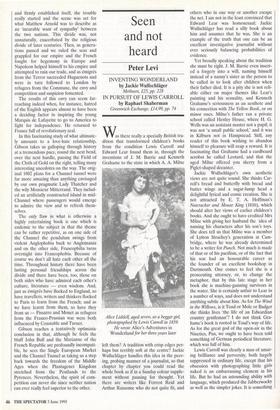Too close for comfort
Teresa Waugh
BEST OF ENEMIES by Robert Gibson Sinclair-Stevenson, £25, pp. 340 or any one of us who has ever been affected by even the faintest hint of Francophilia, Robert Gibson's Best of Enemies, which traces Anglo-French rela- tions from the Norman Conquest to the present day, will in parts make dreadfully painful reading. Do they, and have they always, hated and despised us quite so much? Cold, perfidious, greedy, drunken, snobbish, proud, barbarous, uncouth. Are we really that bad?
Some of the revelations about ourselves in this book should indeed make us hang our heads in shame, for here we have evidence from Napoleon himself, of the way in which the English aristocracy and so-called gentlemen treated the common people and ordinary soldiers like so many dogs. Unfortunately, this evidence is corroborated by a statement from the Duke of Wellington to the effect that our methods of conscription brought together the scum of the earth.
Before we are next tempted thoughtless- ly to boast about our longbows, and Crdcy and Poitiers and the like, perhaps we should spare a thought for the French pop- ulation of the day who, in the wake of such victories by the English were subjected to the most appalling chevauchees. These chevauchees involved the English soldiery running amok, marauding, looting, raping and laying waste the countryside. The rationale which lay behind all these activities was that, if the French King was unable to protect his people from such ter- rible things, then wouldn't they be better ruled by an English king — who, inciden- tally, was probably a Frenchman anyway?
In fact Gibson traces the roots of nation- alism, as we now know it, back to these days, before which time loyalties were to a ' much smaller group — family, village, region whatever, whilst the educated class- es moved freely around Europe as if it were one great country, paying scarce attention — or so it seems — to the wars between their rulers, which they regarded as little more than family feuds.
Once nationalism had truly taken root and firmly established itself, the trouble really started and the scene was set for what Matthew Arnold was to describe as an 'incurable want of sympathy' between the two nations. This divide was, not unnaturally, exacerbated by the religious divide of later centuries. Then, as genera- tions passed and we ruled the seas and grappled for our empire and the French fought for hegemony in Europe and Napoleon helped himself to his empire and attempted to ruin our trade, and as émigrés from the Terror succeeded Huguenots and were in turn followed to London by refugees from the Commune, the envy and competition and suspicion fomented.
The results of this envy can seem far- reaching indeed when, for instance, hatred of the English appears almost to have been a deciding factor in inspiring the young Marquis de Lafayette to go to America to fight for independence. He returned to France full of revolutionary zeal.
In this fascinating study of what ultimate- ly amounts to a love-hate relationship, Gibson takes us galloping through history at a tremendous pace, round the next bend, over the next hurdle, passing the Field of the Cloth of Gold on the right, telling many interesting anecdotes on the way. The orig- inal 1802 plans for a Channel tunnel were far more amazing than anything envisaged by our own pragmatic Lady Thatcher and the wily Monsieur Mitterrand. They includ- ed an artificially constructed island in mid- Channel where passengers would emerge to admire the view and to refresh them- selves.
The only flaw in what is otherwise a highly entertaining book is one which is endemic to the subject in that the theme can be rather repetitive, as on one side of the Channel the pendulum swings from violent Anglophobia back to Anglomania and on the other side, Francophilia turns overnight into Francophobia. Because of course we don't all hate each other all the time. Throughout history there have been lasting personal friendships across the divide and there have been, too, those on both sides who have admired each other's culture, literature — even wisdom. And, just as émigrés have flocked to England, so have travellers, writers and thinkers flocked to Paris to learn from the French; and as we have learnt from them, so have they from us — Pissarro and Monet as refugees from the Franco-Prussian war were both influenced by Constable and Turner.
Gibson reaches a tentatively optimistic conclusion in that, although he feels the bluff John Bull and the Marianne of the French Republic are profoundly incompati- ble, he sees the Single European Market and the Channel Tunnel as taking us a step back towards the freedom of the Middle Ages when the Plantagenet Kingdom stretched from the Pentlands to the Pyrenees. Nevertheless, the spirit of com- petition can never die since neither nation can ever really feel superior to the other.



































































 Previous page
Previous page